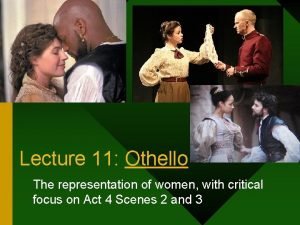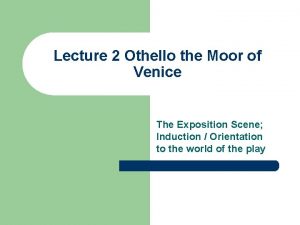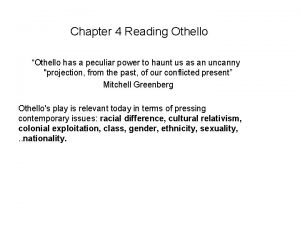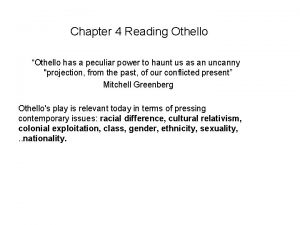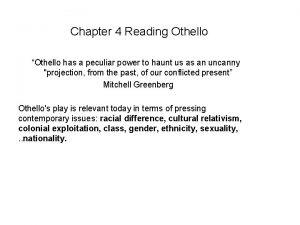Lecture 11 Othello The representation of women with







































- Slides: 39

Lecture 11: Othello The representation of women, with critical focus on Act 4 Scenes 2 and 3

Lecture Focus A) Understanding Desdemona’s character B) The shift in the portrayal of Desdemona C) Light touch on Emilia D) Comparing Bianca with Desdemona E) Shakespeare’s treatment of the female voice F) Critical analysis of Desdemona’s character

The 3 women in Othello • Desdemona, Bianca, Emilia • Occupationally distinct • Accusations brought against them: sexual promiscuity The incidents which provoke the slander may be of different types, yet they yield the identical slur, the identical slur of sexual promiscuity – the most readily available form of assault on a woman’s reputation.

Lecture Focus A) Understanding Desdemona’s character B) The shift in the portrayal of Desdemona C) Light touch on Emilia D) Comparing Bianca with Desdemona E) Shakespeare’s treatment of the female voice F) Critical analysis of Desdemona’s character

Desdemona • Propelling the movement of the play • Desdemona: derivation of her name – “ill-fated” • Helpless, hapless victim or culpable agent of her fate?

• Desdemona proclaims before the Senate; ‘that i did love the Moor to live with him. . . by his dear absence. Let me go with him. ’ (I. III. 245 -56) • The nature of Desdemona’s love “ I saw Othello’s visage in his mind, And to his honours and his valiant parts Did I my soul and fortunes consecrate. ” (I. III. 252 -54)

Desdemona’s ignorance • Desdemona’s view of Othello as unshakable is in itself disastrously unshakable (p 197) • A bewildered Desdemona asks Othello ‘Alas what ignorant sin have I committed? ’ (IV. II) • Result: Desdemona’s dazed, miserable, withdrawal at the end of the play vs. Othello’s dazed, miserable aggression

Des. This is a trick, to put me from my suit. Pray you let Cassio be receiv'd again. Oth. Fetch me the handkerchief, my mind misgives. Des. Come, come; You'll never meet a more sufficient man. Oth. The handkerchief! Des. I pray talk me of Cassio. Oth. The handkerchief! Des. A man that all his time Hath founded his good fortunes on your love, Shar'd dangers with you-Oth. The handkerchief! Des. I' faith, you are to blame. Oth. Zounds! Exit Othello. (III. IV. 87 -98)

Lecture Focus A) Understanding Desdemona’s character B) The shift in the portrayal of Desdemona C) Light touch on Emilia D) Comparing Bianca with Desdemona E) Shakespeare’s treatment of the female voice F) Critical analysis of Desdemona’s character

The shift in the portrayal of Desdemona • Othello in the beginning of the play proclaims: “Tis yet to know, – Which, when I know that boasting is an honour…” (I. II. 19) • Compare with Desdemona’s speech: “My downright violence and storm of fortunes May trumpet to the world: my heart's subdued…” (I. III. 245) Both characters are active, resolute and confident

The shift in the portrayal of Desdemona • Act 4 scene 1 onwards, Desdemona’s passivity becomes most disturbing. • Quite suddenly, she seems to lack the power and will to challenge or resist anyone. • Ironic that her behaviour should be associated as such especially in Cyprus, which is associated with chaos. • Her effort to find out what she has done wrong is so nervous and ambiguous that Othello assumes them to be admissions of guilt. (p 189, 191, 193)

Desdemona’s imperceptiveness • Effect of Desdemona’s philosophic generalizations. “… and in such cases Men's natures wrangle with inferior things, Though great ones are their object. 'Tis even so” (III. IV. 139 -41) • Desdemona’s need to reassure and calm herself is reflected all the more clearly in: “For let our finger ache, and it indues Our other healthful members even to that sense Of pain” (III. IV. 142 -4)

Accused of sexual promiscuity: Iago to Roderigo in Act 2 Scene 1 p 71; p 73 • Her eye must be fed • What delight shall she have to look on the devil • A fresh appetite • Now…her delicate tenderness will… begin to heave the gorge and • Disrelish and abhor the Moor

But Shakespeare allows the women to speak for themselves… • Desdemona’s absolute view on adultery vs. Emilia’s relative view as reflected in Act 4 scene 3 Lines 79 -81: “Why the wrong is but a wrong i' the world: and having the world for your labour, tis a wrong in your own world, and you might quickly make it right. ” • While Desdemona’s gentle assertions are more absolute (exclusive opposites), Emilia argues that the losses and gains are relative.

Do the female characters reflect self-charity or self-abnegation? “… nor know I aught By me that's said or done amiss this night; Unless self-charity be sometimes a vice, And to defend ourselves it be a sin When violence assails us. ” (II. III. 194 -8) • Self-charity and self-abnegation (setting aside of self-interest for the sake of others, a belief, principle)?

• Emilia further argues that abuse is fair exchange for abuse – for self-respecting women, it is deemed a self-charitable defence. “Why, we have galls, and though we have some grace, Yet have we some revenge …. Then let them use us well: else let them know, The ills we do, their ills instruct us so. ” (IV. III. 91 -2, 101 -2) Abuse is fair exchange for abuse for selfrespecting women, it is deemed a selfcharitable defence against husbands who strike them or break out in peevish jealousies

Lecture Focus A) Understanding Desdemona’s character B) The shift in the portrayal of Desdemona C) Light touch on Emilia D) Comparing Bianca with Desdemona E) Shakespeare’s treatment of the female voice F) Critical analysis of Desdemona’s character

Emilia • Emilia’s responses to Iago – resentful forbearance • While Emilia reflects a feisty defense, her attitude towards Iago appears almost puzzling. She shows more grace and submission than she shows revenge.

Outspoken only in front of Desdemona • In a speech reminiscent of Shylock’s ‘Hath not a Jew eyes? ’, Emilia argues that women are physically no different to men: ‘Let husbands know, Their wives have sense like them; they see and smell, And have their palates both for sweet and sour As husbands have’ (IV. 3. 92 -5)

Suggests that men are brutish and simplistic ‘They eat us hungerly, and when they are full, /They belch us’ (A 3 S 4 lines 101 -2). • Unable to control their desires with logical thought. • Ironic that the actions of Iago and Othello in this play confirm her arguments. • After Othello’s opinion of her as a “simple bawd” (IV. II. 19)

Bianca • Portrayal of Bianca -c/r: Emilia – accused by Iago of promiscuity -c/r: Desdemona – beguiled many men, including Roderigo (who calls her a strumpet) • Bianca’s love for Cassio

Lecture Focus A) Understanding Desdemona’s character B) The shift in the portrayal of Desdemona C) Light touch on Emilia D) Comparing Bianca with Desdemona E) Shakespeare’s treatment of the female voice F) Critical analysis of Desdemona’s character

Parallels between Bianca and Desdemona • Bianca’s lament about the tedium of absent lovers parallels Desdemona’s speech about the “heavy interim” she would suffer in Othello’s “dear absence” if he went off to Cyprus without her. (Act 1) • Like Bianca, both Emilia and Desdemona were ordered by their husbands to “leave me for this time”

The muted female voice giving voice to their lovers’ innermost thoughts BIANCA Why, I pray you? CASSIO Not that I love you not. BIANCA But that you do not love me. (III. IV. 191 -2)

Bianca’s response • Bianca’s “I must be circumstanced” • Bianca’s love on Cassio’s terms • Like Bianca, Emilia is also banished to the periphery of her lover’s life and knows that she too must love Iago on his terms and conditions. - Emilia’s “my wayward husband” “What he will do with it, heaven knows, not I: I nothing, but to please his fantasy” ( III. 295 -6)

• Similarly Desdemona’s words echo the same attitude as Bianca “ Be as your fancies teach you. Whate’er you be, I am obedient” (III. 88 -9)

Lecture Focus A) Understanding Desdemona’s character B) The shift in the portrayal of Desdemona C) Light touch on Emilia D) Comparing Bianca with Desdemona E) Shakespeare’s treatment of the female voice F) Critical analysis of Desdemona’s character

Reading between the silences • Reticence as a strategy adopted by “Ungentle Desdemona” “ Come, my dear love, The purchase made, the fruits are to ensue; The profit’s yet to come ‘tween me and you. (II. III. 8 -10) “All’s well now, sweeting; Come away to bed… Come, Desdemona, ‘tis the soldiers’ life, To have their balmy slumbers wak’d with strife. ” (II. III. 252 -53, 257 -58) • Effect of Desdemona’s silences modesty on her part OR distaste for Othello?

Desdemona’s critical silences • Desdemona’s modesty vs. Othello’s perception of distaste • Othello’s preconceptions (as shaped by Iago): “In Venice they do not let God see the pranks They dare not show their husbands…” (III. 202 -03) • Desdemona’s female propriety fuels the white code of black unattractiveness demoralised Othello • Desdemona’s predicament shamed if frankly responsive, deemed as rejecting if reticent (maintains the silence)

The muted female voice is displaced. • Restriction and confining of the women’s voice to the private spheres • The use of language to displace Desdemona by placing her in her “rightful” sphere – the private Desdemona: My lord? Othello: Get you to bed on th’instant; I will be returned/ forthwith. Dismiss your attendant there. Look’t be/ done. (IV. III. 8)

The female voice rendered meaningless Desdemona: “ Upon my knees, what doth your speech import? I understand the fury in your words But not words” (IV. II. 30 -1) • There is also no followup after Desdemona’s and Emilia’s speech about husbands and wives in Act 4 Scene 3.

Lecture Focus A) Understanding Desdemona’s character B) The shift in the portrayal of Desdemona C) Light touch on Emilia D) Comparing Bianca with Desdemona E) Shakespeare’s treatment of the female voice F) Critical analysis of Desdemona’s character

Terry Eagleton on Desdemona as the desexualised Madonna • Desdemona may be seen as the desexualized Madonna whose purity of being (which is the result of her being desexualized) may protect Othello (at least representatively) from the chaos which the female nothing threatens at the same time. • Eagleton further suggests that this is sublimely terrifying because Desdemona represents a lack (a nothingness), yet at the same time, she also has the power to incite the “everything” of desire in Othello himself, and in doing so, destroy him.

Female sexuality as potentially threatening? • Desdemona as the desexualized Madonna - threatening - protective purity Othello: “ But I do love thee, and when I love thee not Chaos is come again” (III. 92 -3)

This purity of being is finally fulfilled ironically in Desdemona’s death. Othello describing sleeping Desdemona: “… that whiter skin of hers than snow, / And smooth as monumental alabaster…” (V. II. 45) “Be thus when thou art dead, and I will kill thee, / And love thee after. ” (V. II. 17 -18) Only when Desdemona is dead that Othello seems certain of his love for her.


Desdemona as the sacrificial victim • Desdemona’s submission to the cruelty of her husband puts to death any questions the audience may have about her character and femininity. • V. II. 122 -23: “Nobody. I myself. Farewell. ” • With the word “nobody”, Desdemona reduces herself to nothing, a blank space in discourse and society.

Gender Politics: Only when the woman is completely silent and silenced (in Desdemona’s case) will the man have total control over her.

To sum up the 1 st 4 acts…
 Presentation of women in othello
Presentation of women in othello Othello lecture
Othello lecture Othello lecture
Othello lecture Othello lecture
Othello lecture Othello lecture
Othello lecture 01:640:244 lecture notes - lecture 15: plat, idah, farad
01:640:244 lecture notes - lecture 15: plat, idah, farad Lời thề hippocrates
Lời thề hippocrates Tư thế worms-breton
Tư thế worms-breton đại từ thay thế
đại từ thay thế Quá trình desamine hóa có thể tạo ra
Quá trình desamine hóa có thể tạo ra Công thức tính độ biến thiên đông lượng
Công thức tính độ biến thiên đông lượng Khi nào hổ mẹ dạy hổ con săn mồi
Khi nào hổ mẹ dạy hổ con săn mồi Thế nào là mạng điện lắp đặt kiểu nổi
Thế nào là mạng điện lắp đặt kiểu nổi Dạng đột biến một nhiễm là
Dạng đột biến một nhiễm là Bổ thể
Bổ thể Vẽ hình chiếu đứng bằng cạnh của vật thể
Vẽ hình chiếu đứng bằng cạnh của vật thể Thế nào là sự mỏi cơ
Thế nào là sự mỏi cơ Phản ứng thế ankan
Phản ứng thế ankan Thiếu nhi thế giới liên hoan
Thiếu nhi thế giới liên hoan Chúa sống lại
Chúa sống lại điện thế nghỉ
điện thế nghỉ Một số thể thơ truyền thống
Một số thể thơ truyền thống Trời xanh đây là của chúng ta thể thơ
Trời xanh đây là của chúng ta thể thơ Các số nguyên tố
Các số nguyên tố Tỉ lệ cơ thể trẻ em
Tỉ lệ cơ thể trẻ em Vẽ hình chiếu vuông góc của vật thể sau
Vẽ hình chiếu vuông góc của vật thể sau đặc điểm cơ thể của người tối cổ
đặc điểm cơ thể của người tối cổ Các châu lục và đại dương trên thế giới
Các châu lục và đại dương trên thế giới Hệ hô hấp
Hệ hô hấp ưu thế lai là gì
ưu thế lai là gì Môn thể thao bắt đầu bằng từ đua
Môn thể thao bắt đầu bằng từ đua Tư thế ngồi viết
Tư thế ngồi viết Bàn tay mà dây bẩn
Bàn tay mà dây bẩn Hát kết hợp bộ gõ cơ thể
Hát kết hợp bộ gõ cơ thể Mật thư tọa độ 5x5
Mật thư tọa độ 5x5 Tư thế ngồi viết
Tư thế ngồi viết V cc cc
V cc cc Voi kéo gỗ như thế nào
Voi kéo gỗ như thế nào Thẻ vin
Thẻ vin Thể thơ truyền thống
Thể thơ truyền thống
